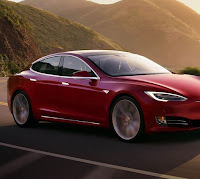Let me explain. Where I live, all of our electricity comes from renewable sources (mostly hydroelectric). So if I switched to an electric car, I would significantly cut down on my carbon footprint and other pollutants that internal combustion (ICE) cars emit.
But for most of the U.S., electricity comes from fossil fuels such as coal and natural gas. Now using an electric car simply moves the tailpipe emissions from the car to a power plant somewhere. The only gain is that electric cars are generally more energy efficient than ICE cars. They have to be. The Tesla Model S Long Range has a 100 kWh (kilowatt hour) battery. That's the equivalent energy of about 2.8 gallons of gasoline. That a car can go almost 300 miles on 2.8 gallons of gas equivalent, is amazing to me. That's the equivalent of 107 miles per gallon.
(A lot of the energy ICE cars produce is lost to heat. In fact, keeping an ICE engine from overheating is a major engineering challenge. That doesn't happen as much in an electric car.)
The problem with electric cars is battery technology hasn't caught up yet. A 100 kWh battery is considered large in electric car terms. But it doesn't hold a lot of energy, relatively. A 15 gallon gas tank holds about 535 kWh of energy.
Let's take the worst case scenario. Car and Driver magazine said in winter the efficiency of their Tesla Model 3 that they were long-term testing dropped in half. They also said they got 281 miles of range under ideal conditions with a Tesla Model S Long Range. So let's say one full battery gets you 145 miles of range (worst case) with 100 kWhs of electricity. If that electricity came from coal (the worst for carbon dioxide emissions), you will put out 2.23 pounds of carbon dioxide.
And, yes, I'm ignoring the oil and coal that goes into manufacturing an electric car. And disposal of the battery/car.
If you drive 145 miles in a car that gets, say, 25 mpg, you'll burn 5.8 gallons. A gallon of gas puts out 19.64 pounds of carbon dioxide when burned*. So that's 113.9 pounds. Or 51.1 times as much as the EV will put out. Or, you'd have to drive an ICE car that gets a whopping 1,277 miles per gallon to only put out as much carbon as a coal-powered EV under the worst circumstances (for the EV).
So there are significant savings in carbon dioxide output using an electric car. I just convinced myself that EVs aren't as dumb as I thought.
Do you agree with me or think I'm nuts. Let me know in the comments below.
*A gallon of gas weighs only 6.3 pounds. So how does burning one put out 19.64 pounds of carbon dioxide? The carbon in the gasoline combines with oxygen from the air to makes carbon dioxide. And there's two oxygen atoms per carbon atom (thus the name, carbon dioxide). So after combustion, gasoline puts out more carbon dioxide than it weighs.
This is part of the study of stoichiometry in chemistry. Gasoline is a mixture of all sorts of things, so let's simplify and use natural gas which is (almost all) methane. One pound of methane (one carbon and four hydrogens) burns with 3.9 pounds of oxygen molecules (two oxygen atoms each) to make 2.74 pounds of carbon dioxide (and 2.24 pounds of water).


No comments:
Post a Comment